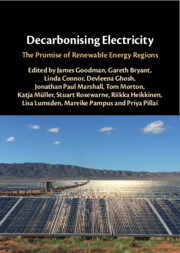Conclusions
Renewable Commons?
Published online by Cambridge University Press: 20 June 2025
Summary
The Conclusions widen the lens to develop a series of substantive recommendations for policymakers, regional, national, and global, who are seeking to strengthen public legitimacy for electricity decarbonisation. It also seeks to draw out implications, in the long haul, for recasting socio-ecological relations under climate change in more democratic directions, to realise its fullest potential for societal transformation, and democratic engagement. As with energy transitions in the past, the current juncture offers manifold (still undreamt-of) possibilities: we argue for a transition regime that allows for such possibilities to be fostered and realised. There is capacity and agency for distributed renewables, for energy transformations and new forms of energy social ownership and democratisation, in other words, for a ‘re-commoning’ of socio-ecological relations.
Information
- Type
- Chapter
- Information
- Decarbonising ElectricityThe Promise of Renewable Energy Regions, pp. 243 - 256Publisher: Cambridge University PressPrint publication year: 2025
References
Accessibility standard: Inaccessible, or known limited accessibility
Why this information is here
This section outlines the accessibility features of this content - including support for screen readers, full keyboard navigation and high-contrast display options. This may not be relevant for you.Accessibility Information
Content Navigation
Allows you to navigate directly to chapters, sections, or non‐text items through a linked table of contents, reducing the need for extensive scrolling.
Provides an interactive index, letting you go straight to where a term or subject appears in the text without manual searching.
Reading Order & Textual Equivalents
You will encounter all content (including footnotes, captions, etc.) in a clear, sequential flow, making it easier to follow with assistive tools like screen readers.
Visual Accessibility
You will still understand key ideas or prompts without relying solely on colour, which is especially helpful if you have colour vision deficiencies.
You benefit from high‐contrast text, which improves legibility if you have low vision or if you are reading in less‐than‐ideal lighting conditions.
Structural and Technical Features
You gain clarity from ARIA (Accessible Rich Internet Applications) roles and attributes, as they help assistive technologies interpret how each part of the content functions.
